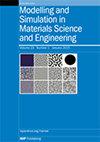Tensile strength prediction of steel sheets: an insight into data-driven models, dimensionality reduction, and feature importance
IF 2.4
4区 材料科学
Q3 MATERIALS SCIENCE, MULTIDISCIPLINARY
Modelling and Simulation in Materials Science and Engineering
Pub Date : 2024-08-29
DOI:10.1088/1361-651x/ad6fc0
引用次数: 0
Abstract
In this work we apply data-driven models for predicting tensile strength of steel coils from chemical composition and process parameters. The data originates from steel production and includes a full chemical analysis, as well as many process parameters and the resulting strength properties from tensile tests. We establish a data pre-processing pipeline, where we apply data cleaning and feature engineering to create a machine-readable dataset suitable for various modeling tasks. We compare prediction quality, complexity and interpretability of pure machine learning (ML) models, either with the full feature set or a reduced one. Dimensionality reduction methods are used to reduce the number of features and therefore reduce complexity, either with a smart selection method or feature encoding, where features are combined and the included information is preserved. In order to determine key features of our models, we are investigating feature importance ratings, which can be used as a feature selection criteria. Furthermore, we are highlighting methods to explain predictions and determine the impact of every feature in every observation applicable for any ML model.钢板拉伸强度预测:对数据驱动模型、降维和特征重要性的深入了解
在这项工作中,我们应用数据驱动模型,根据化学成分和工艺参数预测钢卷的抗拉强度。数据来源于钢铁生产,包括完整的化学分析、许多工艺参数以及拉伸试验得出的强度属性。我们建立了一个数据预处理流水线,应用数据清理和特征工程来创建适合各种建模任务的机器可读数据集。我们比较了纯机器学习(ML)模型的预测质量、复杂性和可解释性,无论是使用完整特征集还是缩减特征集。降维方法可用于减少特征数量,从而降低复杂性,降维方法可采用智能选择方法或特征编码方法,即对特征进行组合并保留其中的信息。为了确定模型的关键特征,我们正在研究可用作特征选择标准的特征重要性评级。此外,我们还在强调解释预测的方法,并确定适用于任何 ML 模型的每个观测中每个特征的影响。
本文章由计算机程序翻译,如有差异,请以英文原文为准。
求助全文
约1分钟内获得全文
求助全文
来源期刊
CiteScore
3.30
自引率
5.60%
发文量
96
审稿时长
1.7 months
期刊介绍:
Serving the multidisciplinary materials community, the journal aims to publish new research work that advances the understanding and prediction of material behaviour at scales from atomistic to macroscopic through modelling and simulation.
Subject coverage:
Modelling and/or simulation across materials science that emphasizes fundamental materials issues advancing the understanding and prediction of material behaviour. Interdisciplinary research that tackles challenging and complex materials problems where the governing phenomena may span different scales of materials behaviour, with an emphasis on the development of quantitative approaches to explain and predict experimental observations. Material processing that advances the fundamental materials science and engineering underpinning the connection between processing and properties. Covering all classes of materials, and mechanical, microstructural, electronic, chemical, biological, and optical properties.

 求助内容:
求助内容: 应助结果提醒方式:
应助结果提醒方式:


